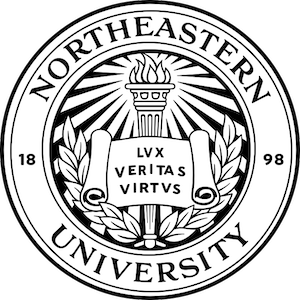The Ivy Scholars guide to Northeastern University’s culture, admissions, and other essential information for prospective students and their families.
Location: Boston, Massachusetts
Mascot: Paws the Husky
Type: Private Research Institution
Population: 27,400 (18,400 undergrads)

Founded in collaboration with the YMCA, Northeastern has become a well regarded research school. Known especially for its co-op program, where students learn experientially and on the job with partners around the globe. While the school’s rapid rise through the rankings has caused concern for some, the school is proud of its academic traditions and focus on research and student experience.

Year Founded: 1898
4 Year Graduation Rate: 19%
Gender Distribution: 51% Female, 49% Male
Acceptance Rate: 19%
Residency: 25% in state, 42% out of state, 33% international
Location Type: Urban
Schedule System: Semesters
Student/Faculty Ratio: 14:1
Average Class Size: 20
Demographics: 45% Caucasian, 30% Other/unknown, 13% Asian, 8% Hispanic, 4% Black
US News Rankings:
Independent Rankings:
Application Deadlines:
Notification Dates:
Acceptance Rates:
Average Applicant Pool: 62,200
Average Number of Applicants Accepted: 11,100
Average Number Enrolled: 2,000
Application Systems: Common App, Coalition App
Average GPA: 4.04 weighted
SAT Scores: 25th% – 1390, 75th% – 1540
ACT Scores: 25th% – 32, 75th% – 35
*Test mandatory. Writing sections are not required.
Demonstrated Interest:
Northeastern does consider demonstrated interest.
Recommendation Letter Policies:
One letter from a counselor and one letter from a teacher are required.
Northeastern Essay Prompts:
Northeastern Essay Writing Tips
Special Notes:
Studio Art majors are required to submit a portfolio, and all students applying to the School of Art and Design are encouraged to submit a portfolio.
Transfer:
Admissions Criteria:
Northeastern is looking for students who are academically prepared for college, and who have demonstrated this through their GPA, course rigor, and standardized test scores. These are the most important factors for admission to Northeastern.
Other important factors include the essay, recommendations, extracurriculars, and talent. More than numbers alone determine admissions, and Northeastern wants an interesting and diverse student body.
Factors which are considered in admission are demonstrated interest, first-generation status, geographic origin, and race/ethnicity.
Recruited athletes do receive an advantage in the admissions process, though they are still expected to have strong academic preparation.
What is Northeastern Looking For?
Northeastern is looking to improve its ranking in the US News annual college list. They are not the only school to try to game the system, but they have done it more successfully than any other. Much of what they are looking for in college applicants reflects this desire to rise in the rankings.
Most important are grades, course rigor, and standardized test scores. These are important for two reasons; the first is that average standardized test scores have a direct impact on the rankings, so Northeastern tries to attract the highest scoring students they can. The other factor is graduation and retention rates: Northeastern wants to ensure that the students it admits are ready for the college experience, and to that end uses their GPA, course rigor, and standardized test scores to judge their level of preparation.
Beyond metrics alone, Northeastern is trying to build a student body of interesting and talented individuals. They are looking for students with clearly demonstrated passions and interests, both academic and otherwise. The student’s extracurriculars and essay are how they look for insight into these. They, like all other elite schools, prefer students who have specialized; focusing on one or two activities or interests.
Northeastern has begun a new diversity initiative, and is looking to increase its recruitment and enrollment of under-represented and minority students on campus. They will thus be actively working to consider such applicants for admissions, although they will not want to compromise their academic standards to do so.
Finally, Northeastern wants to increase its yield, or the number of admitted students who attend, and thus looks to student’s demonstrated interest.
Northeastern Strategy:
The most important consideration when applying to Northeastern is academic readiness, as represented by GPA, test scores, and course rigor. You should be taking the most challenging courses offered by your school that you can succeed in. Further, you want your standardized test scores to be as high as possible; if they are not at the 50th percentile, consider studying and retesting. As Northeastern has been consistently trying to raise their average, having scores over this mark is even better, although not strictly necessary.
As Northeastern is trying to increase its yield, demonstrating interest and applying Early Decision are good ways to show the school that you are interested. Applying ED is especially helpful if Northeastern is your top choice, as it doubles your chances of admission compared to Regular Decision. Applying Early Decision II is a good idea if you aren’t ready for the first round of ED, or if you want more time to raise your test scores.
Unlike many top schools, Northeastern does not consider legacy status. This is a small but helpful thing, as legacy admits drive up the competition for non-legacy students, and are often admitted at twice the average rate.
Finally, you should clearly demonstrate your passions and interests through your extracurriculars and personal statement. As Northeastern does not have supplemental questions, there is less room to expound upon what your passions are and what makes you unique. This increases the importance of the personal statement, as it is the only piece of writing admissions will have to make a decision with.
Schools:
Core Requirements:
Courses of Study:
AP Credit Policies:

Honors Programs:
Research Availability:
Study Abroad:
Business Options:
Pre-Med Options:
The health sciences major serves as a catch-all for students interested in pursuing careers in medicine.
Pre-Law Options:
Computer Science Options:
Additional Specialty Programs:
Programs for High Schoolers:

School Motto: Light, Truth, Courage
Mission and Values:
Residential Housing System:
Freshmen are divided into groups, called living learning communities, based on shared academic or social interests. These can fill floors or even buildings of residence halls. The school runs traditional, suite, and apartment style residence halls. Honors students are housed together. All first and second year students are required to live on campus, upperclassmen may continue to live on campus or move off.
Housing Statistics:
Campus & Surrounding Area:
Transportation:
Traditions:
Student-Run Organizations:
Sports:
Greek Life:
Nightlife:

Yearly Cost of Attendance:
Financial Aid:
75% of students receive some form of financial aid. Northeastern commits to meeting every student’s demonstrated need, and will maintain that amount for 8 semesters of attendance. Aid packages will be reevaluated if tuition increases or if your family’s finances change. Students are required to fill out the Free Application for Federal Student Aid (FAFSA) each year to be eligible for aid.
Additional Financial Aid & Student Loan Information
Scholarships:
There are a number of merit-based scholarships which are also available. These do not require FAFSA to be filled out to qualify for, all students are automatically considered. Some programs, such as the Torch Scholars, have additional requirements to be eligible.

Ivy Scholars is the leading educational consultant in Sugar Land, Texas, providing admissions coaching, test prep, and more to help students enroll at top tier schools.

Call us now: +1 (281) 215-5148
.
Get expert tips, admissions updates, and resources delivered straight to your inbox.


